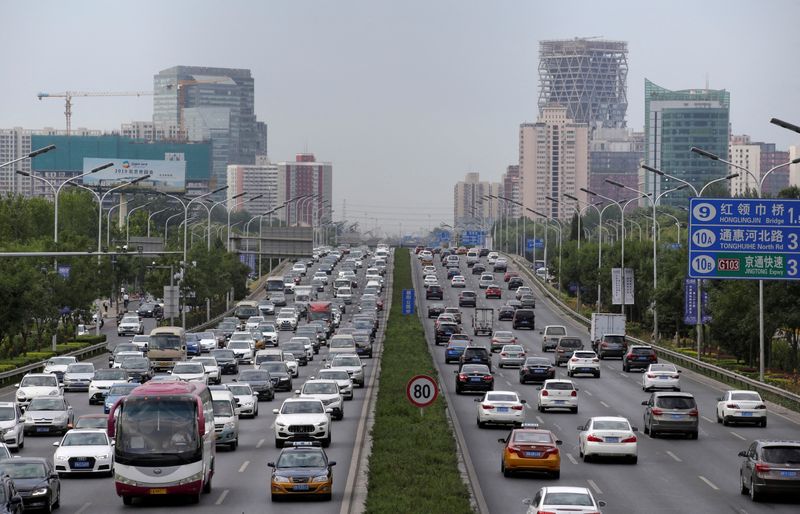SHANGHAI (Reuters) -China's passenger vehicle sales fell for the first time in six months in November and are expected to stay flat next year, an industry body said on Thursday, as demand weakens faster than expected, even as stringent COVID rules are eased.
Vehicle sales last month fell 9.5% from a year earlier to 1.67 million units, the first decline since May, according to the China Passenger Car Association (CPCA).
Many large cities imposed some form of lockdowns last month as COVID-19 cases rose.
"The November sales were far worse than previous expectations," Cui Dongshu, the CPCA's secretary general, told an online briefing.
"The current trend is unprecedented since the financial crisis in 2008," he said, while adding that the significant change in China's COVID policies in recent days means that the three-year pandemic is almost over, which should restore consumer confidence.
China has started easing anti-virus measures after public frustration boiled over late last month, sparking protests against COVID controls that were the biggest demonstration of public discontent since President Xi Jinping came to power in 2012.
But analysts say economic activity will take some time to recover.
The association said it expects passenger vehicle sales to reach 20.6 million units next year, flat from 2022, a forecast more optimistic than some street views.
Analysts at China Merchants Bank International expect retail passenger vehicle sales in China, the world's biggest car market, to drop 6% next year due to the expiry of a purchase-tax cut.
Even with easing COVID restrictions, the sales outlook remains subdued as car makers grapple with rising inventories of unsold vehicles.
After two more years of struggling under COVID, China's working class people have seen their wealth and consumption power shrink, Cui said, adding that no sudden jump was expected in December car sales despite the relaxation of virus measures.
One suggestion made by the association was to extend a purchase tax cut for small engine cars, due to expire at the end of this month, to at least June to help buffer the demand slump, he said.
U.S. electric vehicle maker Tesla (NASDAQ:TSLA) planned to cut December output of its Model Y at its Shanghai plant by more than 20% from the previous month, two people with knowledge of electric vehicle maker's production plan said on Monday.
A Tesla representative called it "false news" without elaborating.
The company, whose Shanghai plant is grappling with elevated inventory levels, is offering a limited-time discount of 6,000 yuan ($859) to buyers in China on some models from Wednesday through to the end of 2022, in addition to a previously announced 4,000 yuan insurance subsidy and an up to 9% price cut in October.
Tesla sold 100,291 China-made cars in November, including 37,798 for export, the CPCA said.
Auto industry officials had expected consumers to rush to buy at the end of the year, before government subsidies and the purchase tax cut expire.
But the incentives did little to boost vehicle sales in recent months, as many COVID restrictions remained in place.

Foreign brands saw even sharper sale slumps in November, with Japanese brands the weakest among them, said Cui.
November sales of Toyota Motor (NYSE:TM) Corp in China fell 18.4% from a year ago, while Nissan (OTC:NSANY) Motor saw a 52.5% drop in its sales.